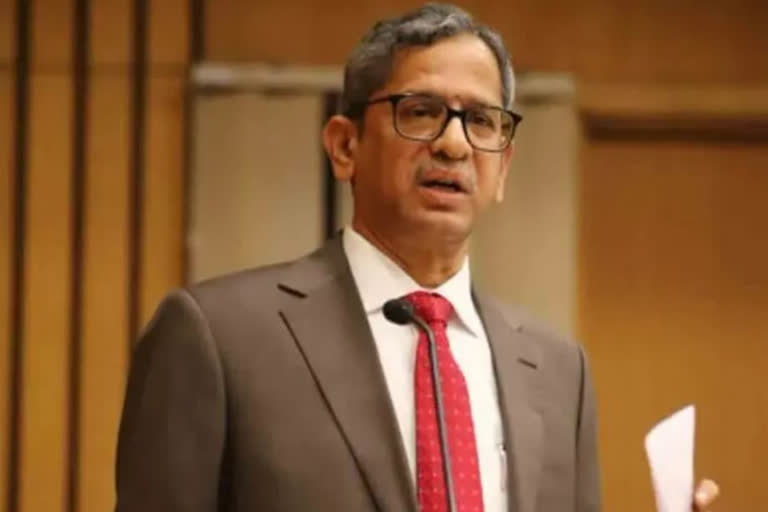New Delhi: Chief Justice NV Ramana is all set to be relieved from his 16-month-long tenure today, marking the end of his tenure as the 48th Chief Justice of India. With a number of key judgments passed under his authority, Ramana will go down in history as a crucial part of the judicial system. His clarity of words, priority towards public interest, and passion for mediation made him stand apart during all the big and small verdicts he passed in the last 16 months.
Justice Ramana assumed responsibility as the 48th CJI on April 24 last year. The second only Telugu person to ascend the highest seat in the Indian judicial system, Ramana has been able to address not just the active cases that came his way, but also the ones that had been plaguing the legal system for a long time. His effective vision has worked in the favor of the entire system, further setting an example before the future CJIs.
After assuming power, CJI Ramana largely focused on tightening reforms around the appointment of judges and increasing their overall number to lessen the tremendous workload on the judges and the consequent delays in the verdicts passed across the country. Since his appointment as the CJI, the Supreme Court collegium has appointed 11 Supreme Court judges and more than 250 High Court judges. He got appointed at least 15 High Court judges during his tenure, while the number of woman judges appointed also set a new high. One of these women has also set her sights on becoming the first woman CJI in 2027.
Among many qualities of CJI Ramana was his emphasis on public awareness. He tried to bridge the gap between the common masses and the Supreme Court by responding to each one of the letters he received from the common masses. He also introduced live broadcasting of swearing-in of judges, set up a special app to make daily hearings in the courts available to journalists, allocated newly constructed chambers to lawyers, and made the Supreme Court auditorium available for use by members of the bar association. Amid the unprecedented pandemic that plagued the nation, he adopted technology and kept the case hearings undisrupted.
Personal Background
Justice NV Ramana was born on August 27, 1957, to Nutalapati Ganapathy Rao and Sarojini Devi in Ponnavaram village of Krishna district in Andhra Pradesh. Born and brought up in a humble background, Ramana was enrolled in a small school in his village. He later studied Law at Nagarjuna University after taking a bachelor's degree in Science.
Justice Ramana was still a student when the emergency hit the nation. It was then that he first got exposed to the problems in the sociopolitical domain. He actively supported his friends from Nagarjuna University who were detained and arrested. He also worked as a journalist for Eenadu daily for some time.
Justice NV Ramana was enrolled in the Bar Council in February 1983. He came to Hyderabad after working as a junior for Kanthamaneni Ravinder Rao, a prominent lawyer in Vijayawada for a few months. There he worked as a junior for ten years under senior lawyer Erasu Ayyapu Reddy. After practicing on his own, he often went to Ayyapureddy's office.
As Ayyapureddy was busy in politics, he supervised the cases. He took charge as Additional Advocate General of Andhra Pradesh in April 1998 and was appointed as High Court Judge on June 27, 2008. From March 13 to May 20, 2013, he was made the interim Chief Justice of the Joint High Court. He was elevated as Chief Justice of Delhi High Court on 2 September 2013. Appointed as Supreme Court Judge on 17 February 2014.
Some key verdicts passed under Justice Ramana's tenure:
Among hundreds of verdicts passed by CJI Ramana, the one on the Pegasus issue is developing as it was deferred yesterday. The Supreme Court had ordered an independent investigation headed by former SC judge Justice RV Ravindran into the matter. Besides, it was under Rmana's tenure that an interim order was issued in the Supreme Court last May to prevent the government from applying sedition cases against the common man. Additionally, a secure electronic system called 'FASTER' was made available to avoid delays in the release of prisoners due to the non-delivery of bail orders by the courts.
Justice Ramana ordered that a Kerala journalist arrested under the stringent UAPA Act should be provided medical services in Delhi, citing their fundamental right to life. He also ordered a CBI investigation into the killing of Dhanbad Additional District Judge Uttam Anand by auto in broad daylight in Jharkhand.
The Shiv Sena split case in Maharastra was also handed over to the Constitutional Bench led by Justice Ramana. Moreover, during the pandemic, Justice Ramana took a case as suo moto and intervened in the matter of oxygen supply and vaccine prices. As a result, the government had to change its policy and announce a free vaccine for all those above the age of 18. At that time, a 5th-class girl named Lidwina Joseph from Kerala wrote a letter to the CJI appreciating the court's intervention.
